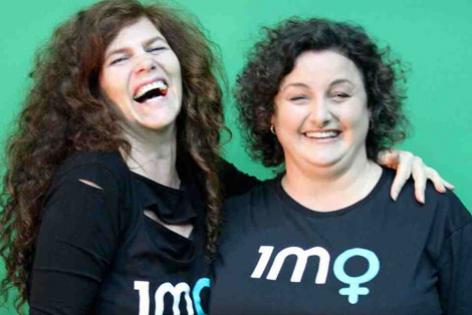Instead Caroline Pidcock has asked her 200 guests at her forthcoming wedding to produce ideas on how to make the world a better place.
A Sydney architect who specialises in sustainable practice, Pidcock is an ambassador for 1 Million Women, an Australian non-political women's organisations which aims to collectively cut one million tonnes of greenhouse gas pollution.
Members are committed to each cutting one tonne from their daily lives within a year of joining the campaign.
Over the weekend of November 16 to 18 it is holding Recipe for Change, which involves women all over the country hosting get togethers to talk about practical ways to save energy, cut waste and pollution, and live more sustainably.
The organisation will then take all the ideas, questions and solutions, photos and video clips generated from the weekend and publish them as an e-book, Recipe for Change, which will be released on International Women's Day in March next year.
As founder Natalie Isaacs says it will be a "recipe book for change written by the women of Australia to share with women around the world".
The organisation is an environmental charity and receives government grants as well as private sponsorship, as well as doing its own fundraising. Started in 2009 Isaacs says it has nearly 77,000 members and is supported by former Irish president Mary Robinson.
"I started 1 Million Women three years ago because I felt there must have been millions of women like me not doing anything on climate change," Isaacs, who has four children, says.
"And I had an epiphany and started taking action in my life ... I got my electricity bill down by 20 per cent, I got our food waste down massively by starting some worm farms and thinking how to shop more strategically."
She has since set up a website that gives practical tips for how to be greener and less polluting.
Meanwhile Pidcock, who is marrying former City of Sydney councillor John McInerney on Saturday afternoon on Observatory Hill in the Rocks, says it's a "paperless wedding", with invitations on a website.
"We've suggested that instead of gifts people bring ideas for how to make the world a better place," she says with a laugh. "We're going to have a place in the community hall where those ideas can be stuck up or pinned up."
And her nieces and nephews will also be interviewing guests.
She admits she is not a "blushing bride" as she'll be turning 50 the following day and it's a second wedding for her partner so the wedding will be a celebration for a number of reasons.
"Even if we get 10 ideas, it's 10 ideas that otherwise would not have been raised.
"One of the terrible things that has happened in the past 10 to 20 years is moving to wasting things with no regard."
One of the problems, she says is perhaps that we work too hard and we have little time to do something about these issues.
We also have miles more possessions than our forebears, and that includes clothes, and home theatres that are anti-social and anti-community.
"When you see old wardrobes you realise people only had a few clothes. They didn't have the need for five lineal metres of hanging space; they could put it into one. They were happy.
"I'm not saying it was all brilliant (but) I think there's something exciting about stopping for a minute and thinking, not how can you change your life ... but how can you change your life and make it better for a whole lot of people."
FACTBOX
TOP 10 TIPS TO SAVE ENERGY, CUT WASTE AND POLLUTION AND SAVE MONEY:
1. Eliminate food waste. Eat half the food you normally waste and save $500 plus a year.
2.Grow your own food. Use kitchen scraps to feed worms (or get some chooks) and make compost. Save $100+ a year.
3.Drive one day less a week and you could save $300 a year. Plan your trips, inflate your tyres properly, keep the boot empty and moderate your speed (90kph on highway) and save $200 plus a year.
4.If you can't be a no car household, at least have no more than one car for every two drivers, using walking, cycling and public transport to balance out car use. Save $4000 plus a year.
5. Set a target to reduce your energy use (look for the amount of consumption in kilowatt hours or kWh on your bill) by at least 10 per cent. Turn off unnecessary lights, gadgets and appliances on standby. Save $175 plus a year.
6. Hang your clothes on the line instead of chucking them in the dryer. You can save pollution and around $400 a year.
7. For heating or cooling, set the thermostat (or control manually) to delay having heating or cooling cut in until they are really needed. Save $500 plus a year.
8. Become a consumer expert on energy saving, water saving and fuel efficiency star systems, and use them when making major purchases like white goods and cars. Save $500 plus a year.
9. Swap clothes, go shopping in your own wardrobe, shop vintage or second hand, avoid fast fashion and buy higher quality clothing that you look after well - washing in cold water and pegging on the line. Save $500 plus a year.
10. Have a strategy especially for major purchases - give yourself a seven-day cooling off period to avoid being swayed by heavy sales pitches, and to ask 'Do I really need this at all?'. Save $500 a year.
11. Swap buying more stuff for creating 'experiences' . OK, you may not save money, but you'll save energy, cut pollution, keep stuff out of land fill and feel better.
More information: recipeforchange.com.au


















__small.png)










